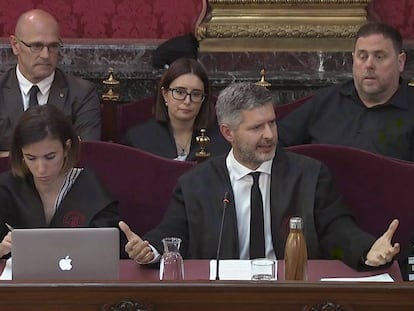Catalan separatists unable to take seats in European Parliament
Spain¡¯s election board decides that Carles Puigdemont, Oriol Junqueras and Antoni Com¨ªn cannot be MEPs because they have not fulfilled a legal requirement to pledge compliance with the Constitution

Spanish election authorities on Thursday confirmed that three Catalan separatist leaders who ran in the European elections of May 26 may not become Members of the European Parliament (MEPs), because they failed to follow national laws requiring a personal pledge to comply with the Spanish Constitution.
The Central Electoral Board, Spain¡¯s election oversight body, has rejected an appeal filed by the lawyer for Carles Puigdemont, the former Catalan premier who held an unauthorized independence referendum in October 2017. Puigdemont fled the country following a unilateral independence declaration that triggered a suspension of regional self-rule, then settled down in Belgium and recently obtained a seat in the EU Parliament with the Lliures per Europa coalition.
The fact that a candidate is voluntarily outside the national territory to avoid action by the justice system does not justify treating him any differently from the other candidates
Election oversight board
Two other separatist leaders, Oriol Junqueras of the Catalan Republican Left (ERC) and Antoni Com¨ªn (also with Lliures per Europa) have also been denied the possibility of taking up their seats as MEPs for the same reason. Com¨ªn fled with Puigdemont in late 2017 and both are fugitives from justice, while Junqueras was arrested and placed in pre-trial custody. The trial of Catalan separatists ended recently, and Junqueras faces a prison term of up to 25 years if found guilty of rebellion.
The election oversight body will inform the European Parliament about its decision. Neither one of the three politicians will have the official MEP credentials they were required to obtain in Spain, and will not be there when the European Parliament convenes on July 2. Their three seats will remain empty.
The board¡¯s decision is based on Spain¡¯s election legislation (LOREG), which states in Article 224.2 that candidates-elect must swear or promise to comply with the Constitution before the Central Electoral Board within five days after earning their position, after which time their seats will be declared empty ¡°and all prerogatives deriving from their position suspended, until this compliance is manifested.¡±
The board considers that candidates must appear in person to swear or promise to comply with the Spanish Constitution
The board considers that candidates must appear in person to express this allegiance. It also rejected the appeal¡¯s references to Constitutional Court case law supporting flexibility in the wording of these pledges. Election officials additionally rejected a Supreme Court precedent cited in the appeal in a bid to suspend the national arrest warrants against Puigdemont and Com¨ªn.
¡°The fact that a candidate is voluntarily outside the national territory to avoid action by the justice system does not justify treating him any differently from the other candidates,¡± said the board.
The deadline for appearing at the board was Monday at noon. Fifty candidates-elect attended the ceremony and promised to uphold the Constitution using varied phraseology that was greenlighted by the oversight body.
The board accepted the pledge read out by ERC candidate-elect Diana Riba, who mentioned the defendants at the trial and described them as ¡°political prisoners.¡± Riba¡¯s husband, Raul Romeva, is one of the jailed leaders of the failed secession attempt awaiting a verdict from the Supreme Court.
English version by Susana Urra.
Tu suscripci¨®n se est¨¢ usando en otro dispositivo
?Quieres a?adir otro usuario a tu suscripci¨®n?
Si contin¨²as leyendo en este dispositivo, no se podr¨¢ leer en el otro.
FlechaTu suscripci¨®n se est¨¢ usando en otro dispositivo y solo puedes acceder a EL PA?S desde un dispositivo a la vez.
Si quieres compartir tu cuenta, cambia tu suscripci¨®n a la modalidad Premium, as¨ª podr¨¢s a?adir otro usuario. Cada uno acceder¨¢ con su propia cuenta de email, lo que os permitir¨¢ personalizar vuestra experiencia en EL PA?S.
?Tienes una suscripci¨®n de empresa? Accede aqu¨ª para contratar m¨¢s cuentas.
En el caso de no saber qui¨¦n est¨¢ usando tu cuenta, te recomendamos cambiar tu contrase?a aqu¨ª.
Si decides continuar compartiendo tu cuenta, este mensaje se mostrar¨¢ en tu dispositivo y en el de la otra persona que est¨¢ usando tu cuenta de forma indefinida, afectando a tu experiencia de lectura. Puedes consultar aqu¨ª los t¨¦rminos y condiciones de la suscripci¨®n digital.










































